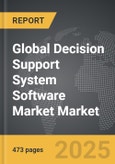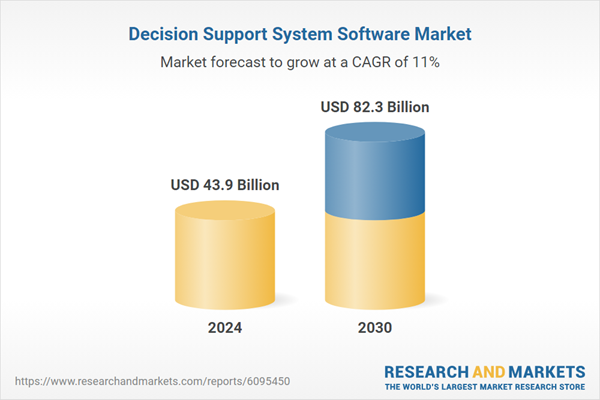Global Decision Support System Software Market - Key Trends & Drivers Summarized
Why Are Decision Support Systems Becoming Integral to Data-Driven Enterprises?
Decision Support System (DSS) software has emerged as a strategic tool enabling organizations to make informed, timely, and data-backed decisions. These systems integrate analytical models, business rules, and historical data with real-time inputs to support managerial, financial, operational, and strategic decision-making processes. As businesses face increasingly complex environments - with high volumes of data, rapid change cycles, and competitive pressure - DSS software is being recognized for its ability to enhance judgment, mitigate risk, and streamline planning across sectors.DSS tools are particularly valued for their ability to translate data into actionable insights, especially in scenarios involving unstructured or semi-structured data. Whether used in healthcare to assess patient outcomes, in finance to evaluate investment options, or in manufacturing to optimize supply chains, DSS systems assist human decision-makers rather than replace them. The growing integration of business intelligence (BI), predictive analytics, and artificial intelligence (AI) functionalities into DSS platforms is driving their adoption beyond traditional applications into broader enterprise ecosystems.
How Are Modern Technologies Redefining the Capabilities of DSS Software?
The architecture of DSS software is evolving rapidly with the incorporation of advanced analytics, cloud computing, and real-time data processing. Next-generation DSS platforms utilize AI/ML algorithms to identify patterns, suggest recommendations, and perform scenario analysis that enhances both operational and strategic decision-making. These platforms also feature interactive dashboards, data visualization tools, and natural language interfaces that enable intuitive decision support for non-technical users.Cloud-based DSS solutions are gaining traction as organizations seek scalability, remote access, and seamless integration with existing enterprise systems. They offer dynamic scalability and support distributed decision-making across geographies and departments. The emergence of cognitive DSS systems - those capable of learning and adapting from user interactions - further enhances decision speed and accuracy. Integration with enterprise resource planning (ERP), customer relationship management (CRM), and supply chain management (SCM) systems also strengthens the reach and utility of modern DSS software across industries.
Which Industries and Functional Areas Are Leading in DSS Adoption?
DSS software finds extensive application across industries where complex, data-intensive decision-making is critical. Healthcare providers utilize DSS to assist in diagnostic evaluation, treatment planning, and resource allocation. Financial institutions deploy DSS to conduct risk modeling, credit analysis, and investment portfolio optimization. Retailers and e-commerce firms rely on DSS for demand forecasting, inventory control, and pricing decisions. In manufacturing, DSS systems aid in process optimization, procurement planning, and maintenance scheduling.Government agencies and public sector organizations use DSS platforms for policy analysis, public health planning, and emergency response coordination. Additionally, education, energy, transportation, and telecommunications sectors are investing in DSS to drive efficiency, manage assets, and support regulatory compliance. Across all these sectors, the common thread is the demand for real-time, accurate, and contextualized support in making high-stakes or operationally significant decisions.
What Factors Are Fueling Growth in the Decision Support System Software Market?
The growth in the decision support system software market is driven by several interlinked trends. The explosion of structured and unstructured enterprise data is necessitating intelligent tools that can distill insights and provide contextual recommendations. The increasing complexity of business operations - combined with shorter decision windows - is boosting demand for systems that enhance decision-making speed and quality.The transition to cloud-based infrastructure and the rise of SaaS delivery models are making DSS solutions more accessible and affordable for businesses of all sizes. & Advancements in AI, machine learning, and big data analytics are significantly expanding the analytical capabilities of DSS platforms. Lastly, rising emphasis on digital transformation, strategic planning, and performance optimization is encouraging organizations to embed DSS tools within core workflows. These factors together are shaping a future-ready, high-value market landscape for decision support system software worldwide.
Report Scope
The report analyzes the Decision Support System Software market, presented in terms of market value (US$). The analysis covers the key segments and geographic regions outlined below:- Segments: Deployment (On-Premise Deployment, Cloud-based Deployment); Organization Size (SMEs, Large Enterprises); Functionality (Data Analysis & Visualization Functionality, Optimization & Simulation Functionality, Forecasting & Prediction Functionality, Collaboration & Communication Functionality); Vertical (Manufacturing Vertical, Healthcare Vertical, Financial Services Vertical, Retail Vertical, Other Verticals).
- Geographic Regions/Countries: World; United States; Canada; Japan; China; Europe (France; Germany; Italy; United Kingdom; Spain; Russia; and Rest of Europe); Asia-Pacific (Australia; India; South Korea; and Rest of Asia-Pacific); Latin America (Argentina; Brazil; Mexico; and Rest of Latin America); Middle East (Iran; Israel; Saudi Arabia; United Arab Emirates; and Rest of Middle East); and Africa.
Key Insights:
- Market Growth: Understand the significant growth trajectory of the On-Premise Deployment segment, which is expected to reach US$51.3 Billion by 2030 with a CAGR of a 9.7%. The Cloud-based Deployment segment is also set to grow at 13.6% CAGR over the analysis period.
- Regional Analysis: Gain insights into the U.S. market, valued at $12 Billion in 2024, and China, forecasted to grow at an impressive 14.7% CAGR to reach $16.8 Billion by 2030. Discover growth trends in other key regions, including Japan, Canada, Germany, and the Asia-Pacific.
Why You Should Buy This Report:
- Detailed Market Analysis: Access a thorough analysis of the Global Decision Support System Software Market, covering all major geographic regions and market segments.
- Competitive Insights: Get an overview of the competitive landscape, including the market presence of major players across different geographies.
- Future Trends and Drivers: Understand the key trends and drivers shaping the future of the Global Decision Support System Software Market.
- Actionable Insights: Benefit from actionable insights that can help you identify new revenue opportunities and make strategic business decisions.
Key Questions Answered:
- How is the Global Decision Support System Software Market expected to evolve by 2030?
- What are the main drivers and restraints affecting the market?
- Which market segments will grow the most over the forecast period?
- How will market shares for different regions and segments change by 2030?
- Who are the leading players in the market, and what are their prospects?
Report Features:
- Comprehensive Market Data: Independent analysis of annual sales and market forecasts in US$ Million from 2024 to 2030.
- In-Depth Regional Analysis: Detailed insights into key markets, including the U.S., China, Japan, Canada, Europe, Asia-Pacific, Latin America, Middle East, and Africa.
- Company Profiles: Coverage of players such as Agilent Technologies Inc., ACG Worldwide, Azenta Life Sciences, BioMicroLab, Brooks Life Sciences and more.
- Complimentary Updates: Receive free report updates for one year to keep you informed of the latest market developments.
Some of the 41 companies featured in this Decision Support System Software market report include:
- 1000minds
- AIMMS
- D-Sight
- Domo Inc.
- IBM Corporation
- Infor
- Jedox
- Microsoft Corporation
- MicroStrategy Incorporated
- Oracle Corporation
- PathWise
- Qlik Technologies Inc.
- Rocket Software
- SAP SE
- SAS Institute Inc.
- Sisense Inc.
- Tableau Software LLC
- TCS TwinX
- TIBCO Software Inc.
- Zynx Health
This edition integrates the latest global trade and economic shifts into comprehensive market analysis. Key updates include:
- Tariff and Trade Impact: Insights into global tariff negotiations across 180+ countries, with analysis of supply chain turbulence, sourcing disruptions, and geographic realignment. Special focus on 2025 as a pivotal year for trade tensions, including updated perspectives on the Trump-era tariffs.
- Adjusted Forecasts and Analytics: Revised global and regional market forecasts through 2030, incorporating tariff effects, economic uncertainty, and structural changes in globalization. Includes historical analysis from 2015 to 2023.
- Strategic Market Dynamics: Evaluation of revised market prospects, regional outlooks, and key economic indicators such as population and urbanization trends.
- Innovation & Technology Trends: Latest developments in product and process innovation, emerging technologies, and key industry drivers shaping the competitive landscape.
- Competitive Intelligence: Updated global market share estimates for 2025, competitive positioning of major players (Strong/Active/Niche/Trivial), and refined focus on leading global brands and core players.
- Expert Insight & Commentary: Strategic analysis from economists, trade experts, and domain specialists to contextualize market shifts and identify emerging opportunities.
Table of Contents
Companies Mentioned (Partial List)
A selection of companies mentioned in this report includes, but is not limited to:
- 1000minds
- AIMMS
- D-Sight
- Domo Inc.
- IBM Corporation
- Infor
- Jedox
- Microsoft Corporation
- MicroStrategy Incorporated
- Oracle Corporation
- PathWise
- Qlik Technologies Inc.
- Rocket Software
- SAP SE
- SAS Institute Inc.
- Sisense Inc.
- Tableau Software LLC
- TCS TwinX
- TIBCO Software Inc.
- Zynx Health
Table Information
| Report Attribute | Details |
|---|---|
| No. of Pages | 473 |
| Published | January 2026 |
| Forecast Period | 2024 - 2030 |
| Estimated Market Value ( USD | $ 43.9 Billion |
| Forecasted Market Value ( USD | $ 82.3 Billion |
| Compound Annual Growth Rate | 11.0% |
| Regions Covered | Global |









